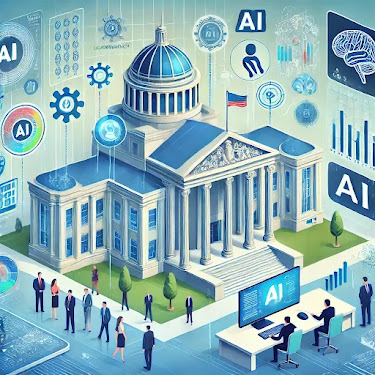In an era where technology is rapidly transforming every aspect of our lives, artificial intelligence (AI) has emerged as a powerful tool with the potential to revolutionize governance. Governments around the world are increasingly recognizing the role AI can play in enhancing transparency and accountability, two pillars essential for maintaining public trust and effective governance. This article explores how AI is being utilized to improve government transparency and accountability, the challenges it faces, and the future possibilities.
AI and Government Transparency
1. Data Accessibility and Analysis
AI can process vast amounts of data far more efficiently than humans, enabling governments to provide citizens with easy access to public information. For example, AI-driven platforms can automatically categorize and publish government documents, budgets, and reports in user-friendly formats. This helps the public, journalists, and watchdog organizations to easily find and analyze information, fostering greater transparency.
2. Real-Time Monitoring
AI systems can monitor government activities in real-time, identifying irregularities or suspicious behavior that might otherwise go unnoticed. For instance, AI-powered tools can analyze procurement data to detect patterns indicative of corruption, such as contract awards to a limited number of vendors. By flagging such issues promptly, AI helps ensure that government operations remain transparent and accountable.
3. Enhanced Public Engagement
AI can also enhance public engagement by providing platforms for citizens to interact with their government. Chatbots and virtual assistants powered by AI can answer citizens’ questions, provide updates on government projects, and collect feedback on policies. This not only makes government more accessible but also ensures that citizen voices are heard and considered in decision-making processes.
AI and Government Accountability
1. Audit and Compliance
AI can significantly improve the audit and compliance processes within government agencies. By automating the analysis of financial transactions, regulatory compliance, and performance metrics, AI can identify discrepancies and inefficiencies more effectively than traditional methods. This ensures that government officials are held accountable for their actions and that public resources are used appropriately.
2. Predictive Analytics
Predictive analytics, a branch of AI, can be used to anticipate potential governance issues before they arise. For example, AI can analyze past data to predict areas where corruption or inefficiency is likely to occur, allowing governments to take preemptive action. This proactive approach not only holds officials accountable but also prevents problems from escalating.
3. Whistleblower Protection
AI can enhance whistleblower protection by providing secure and anonymous channels for reporting misconduct. Machine learning algorithms can analyze reports to identify patterns of corruption or abuse while protecting the identity of the whistleblower. This encourages more people to come forward with information, increasing government accountability.
Challenges and Ethical Considerations
While AI offers significant potential for enhancing government transparency and accountability, it also presents challenges. One of the primary concerns is the potential for bias in AI algorithms. If not properly managed, AI systems can perpetuate existing biases, leading to unfair or discriminatory outcomes. To address this, governments must ensure that AI algorithms are transparent, auditable, and developed with ethical considerations in mind.
Privacy is another critical concern. The use of AI for monitoring and analyzing government activities must be balanced with the need to protect sensitive information. Governments must establish clear guidelines on data usage and ensure that AI systems comply with privacy regulations.
The Future of AI in Governance
The future of AI in governance holds immense promise. As AI technology continues to evolve, its applications in enhancing transparency and accountability will expand. We can expect to see more sophisticated AI-driven tools that not only detect issues but also provide actionable insights for improving governance. Furthermore, as AI becomes more integrated into government operations, it will play a key role in fostering a culture of openness, integrity, and accountability.
Governments that embrace AI responsibly will be better equipped to meet the demands of an increasingly informed and engaged citizenry. By leveraging AI to enhance transparency and accountability, governments can build trust with their citizens, improve the effectiveness of public services, and ultimately strengthen democratic governance.
In conclusion, AI is a powerful ally in the quest for more transparent and accountable government. While challenges remain, the potential benefits far outweigh the risks. As we move forward, it is crucial for governments to adopt AI with a clear understanding of its capabilities and limitations, ensuring that it is used in ways that uphold the principles of fairness, transparency, and accountability.

.jfif)
.jfif)


No comments:
Post a Comment